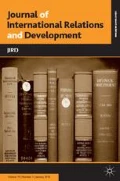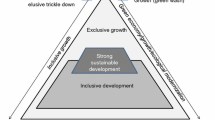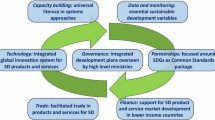Abstract
The Cotonou Partnership Agreement, signed in Benin in 2000 between the European Union (EU) and its African-Caribbean-Pacific (ACP) partners, constitutes the basis for much of the EU's interaction with developing countries. The Agreement stresses the need to prioritize poverty alleviation and sustainable development as part of the overall development process. While an all-embracing approach to tackling problems of poverty and the environment ostensibly fulfils a number of social and political requirements where the EU's moral obligation towards the South is currently concerned, Cotonou's flagship provisions invite closer scrutiny. This paper considers the EU's attempt to marry poverty alleviation and sustainable development within its pro-poor strategy and assesses the likely efficacy of this approach in achieving Cotonou's stated aims.
Similar content being viewed by others
Notes
In terms of food security, on a national level, self-sufficiency entails ‘meeting food needs as far as possible from domestic supplies and minimising dependence on food trade’ while the concept of self reliance ‘takes into account the possibilities offered by international trade’ (UNESCAP Bulletin on Asia-Pacific Perspectives 2004–2005).
Approximately 30 percent of all incidence of disease in Sub-Saharan Africa can be linked to environmental factors (Steele et al. 2002).
In southern Africa, reliance on non-agricultural sources of income for the rural poor is estimated to be as high as 80–90 percent of household earnings (Organisation for Economic Cooperation and Development 2001).
The so-called ‘EBA (Everything But Arms) Regulation’ (Regulation (EC) 416/2001) was adopted by the EU in February 2001, granting duty-free access to all imports from least developed countries (LDCs) without any quantitative restrictions, with the exception of arms and munitions. Only imports of fresh bananas, sugar and rice were not fully liberalized immediately. Duty-free access was granted for bananas in January 2006, while duties on the remaining products will be gradually reduced, for sugar in July 2009 and for rice in September 2009.
That this position is largely accepted as a truism is acknowledged by the EU Trade Commissioner, Peter Mandelson (2005), in a speech in Edinburgh in July 2005. He argues that the public should not fall into ‘the simplistic trap of believing that abolition of all or part of the CAP is the solution to the problems of Africa’.
Botswana is a good case in point. The country represents an economic success story in a region of often failing or faltering economies. Botswana managed to achieve and sustain growth rates of over 7 percent between 1985 and 1999, accruing nearly USD6 billion in foreign exchange reserves in the process as well as diversifying its economy away from the mining sector. Despite this, 47 percent of the population remain below the poverty line, confined, in many instances, to marginal, environmentally fragile areas (Leith et al. 1999).
‘Farm-to-fork’ legislation, based on the European Commission (2000a) White Paperon Food Safety, was passed in January 2002. The European Food Safety Authority (EFSA) was established to oversee the implementation of the policy. See Regulation (EC) No 178/2002 of the European Parliament and of the Council of 28 January 2002 laying down the general principles and requirements of food law, establishing the European Food Safety Authority and laying down procedures in matters of food safety.
Recent research suggests that the future of the banana may be threatened by the black sigatoka fungus which attacks the ubiquitous Cavendish variety. As nearly all plantation farmed bananas are of this variety, a rapid spread of the fungus could be catastrophic for the industry (New Scientist (13 May 2006): 5).
Traditionally, coffee is a shade-grown crop that requires little fertilizer in order to develop. However, in order to increase yields ‘full-sun’ variants were developed. These require substantial quantities of agro-chemical inputs in order to propagate successfully (Clay 2004).
The EU will liberalize around 95 percent of its imports from South Africa within 10 years, while the respective figures on the South African side are approximately 86 percent in 12 years (European Commission 1999).
Adapted from figures in Kirk and Stern (2003).
References
Brenton, Paul and Miriam Manchin (2002) Making EU Trade Agreements Work: The Role of Rules of Origin, Brussels: Centre for European Policy Studies, Working Document No. 183, March.
Clay, Jason (2004) World Agriculture and the Environment, Washington, DC: Island Press.
Cotonou Partnership Agreement (2000) Signed Between the European Commission and the African-Caribbean-Pacific Group of States, Benin, 23 June, Official Journal L 317 of 15 December 2000.
Daly, Herman E. (1992) Steady-State Economics, 2nd edn, London: Earthscan Publications.
Daly, Herman E. (1996) Beyond Growth: The Economics of Sustainable Development, Boston, MA: Beacon Press.
Dearden, Stephen J.H. (2007) ‘A Review of EU Development Policy’, presented at the Migration and People Movement in Europe: Threat or Benefit? Conference, Vienna, 28–29 September, Fifth International Workshop of the Network ‘Strategic Elites and EU Enlargement’, organized in connection with the Austrian Academy of Sciences.
Esty, Daniel C., Tanja Srebotnjak, Christine H. Kim, Marc A. Levy, Alexander de Sherbinin and Bridget Anderson (2006) Pilot 2006: Environmental Performance Index, New Haven, CT: Yale Centre for Environmental Law and Policy.
European Commission (1999) Agreement on Trade, Development and Cooperation between the European Community and its Member States, of the one part, and the Republic of South Africa, of the other part, Official Journal L 311 of 4 December 1999.
European Commission (2000a) ‘White Paper on Food Safety’, Brussels, 12 January, COM(1999)719 final.
European Commission (2000b) ‘European Policy to Support Rural Development’, Brussels: Policy Orientation Paper, February.
European Commission (2006) ‘EU Budget 2006’, available at http://eur-lex.europa.eu/budget/www/index-en.htm (29 June, 2006).
Godfrey, Claire (2002) ‘Stop the Dumping! How EU Agricultural Subsidies are Damaging Livelihoods in the Developing World’, Oxfam Briefing Paper No. 31, October.
Goodison, Paul and Colin Stoneman (2005) ‘Trade, Development and Cooperation: Is the EU Helping Africa?’, in Henning Melber, ed., Trade, Development, Cooperation: What Future for Africa?, 16–34, Uppsala: Nordiska Afrikainstitutet.
Griswold, Daniel T. (2001) ‘Trade, Labour, and the Environment: How Blue and Green Sanctions Threaten Higher Standards’, Washington, DC: Centre for Trade Policy Studies Study Paper (CATO Institute), No. 15, August.
Grossman, Gene M. and Alan B. Krueger (1994) ‘Economic Growth and the Environment’, Cambridge, MA: NBER Working Paper No. 4634, February.
Hoekman, Bernard M., Francis Ng and Marcelo Olarreaga (2001) ‘Eliminating Excessive Tariffs on Exports of Least Developed Countries’, World Bank Discussion Paper, No. 2604, May.
Holland, Martin (2003) ‘20/20 Vision? The EU's Cotonou Partnership Agreement’, The Brown Journal of World Affairs IX (2): 161–175.
Insausti, Mikel (2001) How Can Multilateral Trade Deliver Sustainable Development Outcomes? (Part 2), Brussels: World Wildlife Fund for Nature (WWF) European Policy Office, May.
Jensen, Michael Friis (2002) ‘Reviewing the SPS Agreement: A Developing Country Perspective’, Centre for Development Research (CDR) Working Paper 02.3., January.
Kipe, Sandie (2003) ‘Everything But Arms: Declining Agricultural Exports from Least Developed Countries’, GAIN Report, No. E23149, June.
Kirk, Robert and Mathew Stern (2003) ‘The New Southern African Customs Union Agreement’, World Bank Africa Region Working Paper Series, No. 57, June.
Kumar, Pranav (2001) ‘Framework for Fair Trade and Poverty Eradication’, Consumer Unity and Trust Society (CUTS) Centre for International Trade, Economics and Environment, Briefing Paper, No. 4.
Kuznets, Simon (1993) ‘Economic Growth and Income Inequality’, in Mitchell A. Seligson and John T. Passé-Smith, eds, Development and Underdevelopment: The Political Economy of Inequality, 43–55, Boulder, CO: Lynne Rienner.
La Vina, Antonio, Lindsey Fransen, Paul Faeth and Yoko Kurauchi (2006) ‘Reforming Agricultural Subsidies: “No Regrets” Policies for Livelihoods and the Environment’, Washington, DC: World Resources Institute White Paper.
Leith, J. Clark, James Sackey and David Burns (1999) ‘Botswana: A Case Study of Economic Policy Prudence and Growth’, World Bank Working Paper, 2004, August.
Madeley, John (2000) Hungry for Trade: How the Poor Pay for Free Trade, London: Zed Books.
Mandelson, Peter (2005) ‘Raising Living Standards in Africa: The G8 Trade Challenge’, Speech, Edinburgh, 6 July, SPEECH 05/418.
Morisset, Jacques (2000) ‘Foreign Direct Investment in Africa: Policies Also Matter’, World Bank Policy Research Working Paper, No. 2481, November.
Morrison, Jamie A. and Richard Pearce (2003) ‘Food Security and Trade: An Overview’, in Food and Agriculture Organisation, ed., Trade Reforms and Food Security: Conceptualising the Linkages, 3–24, Rome: Food and Agriculture Organisation.
Morrissey, Oliver (2003) ‘Trade Liberalisation and Food Security in Developing Countries’, in Food and Agriculture Organisation, ed., Trade Reforms and Food Security: Conceptualising the Linkages, 35–42, Rome: Food and Agriculture Organisation.
Murphy, Sophia (2003) ‘The Role of Transnational Corporations’, in Food and Agriculture Organisation, ed., Trade Reforms and Food Security: Conceptualising the Linkages, 117–126, Rome: Food and Agriculture Organisation.
Muyakwa, Stephen L. (2001) ‘Enhancing LDC's Exports to OECD Markets: Challenges and Opportunities’, Consumer Unity and Trust Society (CUTS) Centre for International Trade, Economics and Environment, African Resource Centre, Policy Brief, No. 2.
Oceana (2006) ‘United States Reasserts Commitment to Eliminating Subsidies Driving the Collapse of the World's Fisheries’, Washington, DC: Press Release, 28 February.
Organisation for Economic Cooperation and Development (2001) ‘‘Poverty–Environment–Gender Linkages’, OECD Journal on Development 2 (4): 1–79.
Panagariya, Arvind (2005a) ‘Liberalising Agriculture’, Foreign Affairs 84 (7): 56–66.
Panagariya, Arvind (2005b) ‘Agricultural Liberalisation and the Least Developed Countries: Six Fallacies’, in David Greenaway, ed., World Economy: Global Trade Policy 2005, 1277–1299, Oxford: Blackwell.
Panayotou, Theodore (1993) Green Markets: The Economics of Sustainable Development, San Francisco: ICS Press.
Reardon, T. (2003) ‘Capital Market Liberalisation and the Latin American Agrifood System’, in Food and Agriculture Organisation, ed., Trade Reforms and Food Security: Conceptualising the Linkages, 127–136, Rome: Food and Agriculture Organisation.
Richardson, Sarah and Jochen Krimphoff (2007) ‘Sustainability Impact Assessment of the EU–ACP Economic Partnership Agreements: Summary of Key Findings, Policy Recommendations and Lessons Learned’, PricewaterhouseCoopers Audit, France.
Roederer-Rynning, Christilla (2005) ‘Centre-Periphery Conflict and Institutional Development: The Significance of North–South Relations for the CAP’, Journal of International Relations and Development 8 (3): 287–310.
Shafik, Nemat and Sushenjit Bandyopadhyay (1992) ‘Economic Growth and Environmental Quality: Time Series and Cross Country Evidence’, World Bank Paper in Preparation for the World Development Report 1992, June.
Shoprite (2006) ‘Shoprite Holdings LTD’, available at http://www.shoprite.co.za (14 July, 2006).
Steele, Paul, Simon Le-Grand, Philip Dobie, Peter Hazelwood and Jan Bojö (2002) Linking Poverty Reduction and Environmental Management: Policy Challenges and Opportunities, Washington, DC: IRDB/World Bank, July.
Stevens, Christopher (2007) ‘Economic Partnership Agreements: What Happens in 2008’, ODI Briefing Paper No. 23, June.
Stuart, Liz (2005) ‘Truth or Consequences: Why the EU and the USA Must Reform their Subsidies, or Pay the Price’, Oxfam Briefing Paper 81, November.
Thomas, David (1998) ‘Desertification and the CCD: Issues and Links to Poverty, Natural Resources and Policies’, Windhoek, Briefing for DFID, October.
Tucker, Richard P. (2000) Insatiable Appetite: The United States and the Ecological Degradation of the Tropical World, Berkeley, CA: University of California Press.
UNESCAP Bulletin on Asia-Pacific Perspectives (2004–2005) available at http://www.unescap.org/pdd/publications/bulletin04-05/bulletin04-05_ch6.pdf (6 July, 2006).
Unnevehr, Laurian J. (2000) ‘Food Safety Issues and Fresh Food Product Exports from LDCs’, Agricultural Economics 23 (3): 231–240.
Van Haren, Nathalie, Saskia Berends, Wiert Wiertsema, Peter van der Gaag and Stephan Verwer (2007) ‘The Flower Industry in Kenya and Ethiopia’, Trade Matters Report, February.
Van Reisen, Miriam, ed. (2007) ‘The EU's Contribution to the Millennium Development Goals — Halfway to 2015: Mid-Term Review’, Alliance 2015 Report, June.
Watkins, Kevin (2002) ‘Cultivating Poverty: The Impact of US Cotton Subsidies on Africa’, Oxfam Briefing Paper No. 30, September.
Watkins, Kevin and Penny Fowler (2004) ‘Rigged Rules and Double Standards: Trade, Globalisation, and the Fight Against Poverty’, Oxfam Campaign Report, February.
Wilson, John S. (2001) ‘Advancing the WTO Agenda on Trade and Standards: A Developing Country Voice in the Debate’, Geneva: The African Economic Research Consortium Conference on Trade, Conference Paper, 8–9 March.
World Bank (2004) ‘World Development Indicators’, available at http://iresearch.worldbank.org/PovcalNet/jsp/index.jsp (29 June, 2006).
World Bank (2005) ‘World Bank and Partners Launch Initiative to “Turn the Tide” of Fisheries Depletion’, Washington, DC: Press Release, 24 August.
World Trade Organisation (2004) ‘Report on the Activities of the Committee on Sanitary and Phytosanitary Measures’, G/L/709, 28 October.
Author information
Authors and Affiliations
Rights and permissions
About this article
Cite this article
Flint, A. Marrying poverty alleviation and sustainable development? An analysis of the EU–ACP Cotonou agreement. J Int Relat Dev 11, 55–74 (2008). https://doi.org/10.1057/jird.2008.1
Published:
Issue Date:
DOI: https://doi.org/10.1057/jird.2008.1




